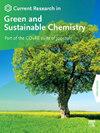推进可持续化学教育:现实世界案例研究的启示
Q2 Materials Science
Current Research in Green and Sustainable Chemistry
Pub Date : 2024-01-01
DOI:10.1016/j.crgsc.2024.100436
引用次数: 0
摘要
本研究旨在分析在绿色化学(GC)和可持续化学(SC)教育的背景下,通过实施两个案例研究 "塑化童年 "和 "拆开汉堡包",整合创新的教学方法。设计案例研究的目的是让学生参与真实世界的情景,从而培养批判性思维和解决实际问题的能力。"塑化童年 "研究了塑料玩具对环境和健康的影响,而 "解密汉堡 "则探讨了以植物为基础的肉类替代品的复杂性。课堂观察法用于系统地观察和分析学生的互动和学习成果。我们的研究结果说明了从 GC 到 SC 的转变,强调了材料替代以外的考虑因素,如营销策略和健康影响。案例研究强调了化学工业在推动可持续创新方面的关键作用以及跨学科方法的价值。面临的一个挑战是如何解决学生对有争议话题的敏感性,以及在研究生课程中增加专业内容的必要性。这项研究说明了将真实世界情景融入化学教育的价值,使学生具备通过创新、道德和负责任的解决方案应对可持续发展挑战的技能和条件。今后的研究应侧重于改进案例研究方法和加强跨学科合作,以进一步推进可持续化学教育。本文章由计算机程序翻译,如有差异,请以英文原文为准。
Advancing sustainable chemistry education: Insights from real-world case studies
This study aims at analysing the integration of innovative teaching methodologies through the implementation of two case studies, “Plasticized Childhood” and “Unpacking Burgers,” in the context of Green Chemistry (GC) and Sustainable Chemistry (SC) education. The case studies were devised with the objective of engaging students in real-world scenarios, thereby fostering critical thinking and practical problem-solving skills. “Plasticized Childhood” examines the environmental and health impacts of plastic toys, while “Unpacking Burgers” delves into the complexities of plant-based meat alternatives. The Classroom Observation method was employed to systematically observe and analyse student interactions and learning outcomes. Our findings illustrate the transition from GC to SC, emphasising considerations beyond material substitution, such as marketing strategies and health implications. The case studies highlighted the pivotal role of the chemical industry in propelling sustainable innovation and the value of interdisciplinary approaches. One challenge was addressing student sensitivities around controversial topics, as well as the need for more specialised content in graduate programmes. The study illustrates the value of integrating real-world scenarios into chemistry education, equipping students with the skills and conditions to address sustainability challenges through innovative, ethical and responsible solutions. It would be beneficial for future research to concentrate on the improvement of case study methodologies and the strengthening of interdisciplinary collaborations, with the aim of further advancing sustainable chemistry education.
求助全文
通过发布文献求助,成功后即可免费获取论文全文。
去求助
来源期刊

Current Research in Green and Sustainable Chemistry
Materials Science-Materials Chemistry
CiteScore
11.20
自引率
0.00%
发文量
116
审稿时长
78 days
 求助内容:
求助内容: 应助结果提醒方式:
应助结果提醒方式:


